They were one of the greatest bands of the 1980s who changed the sound of rock music until their dramatic split – but The Police are still clashing nearly five decades later.
In the latest chapter in their tumultuous relationship, legendary frontman Sting is being sued for millions of pounds in lost royalties by his former bandmates, guitarist Andy Summers and drummer Stewart Copeland.
It is well-documented that the new wave band, who formed in London back in 1977, didn’t break up cleanly, succinctly or definitively.
In fact, their astronomical success was achieved in a relatively short space of time, with their last tour, the 105-show run for their Synchronicity album, ending in 1984 with no farewell to each other or to the fans.
Sting, who once joked the band began as a democracy before spiralling into a ‘benign dictatorship’ by the end, felt they had reached their personal ‘Everest’ and should quit while riding the wave.
In a Rolling Stone interview in 1983, he admitted: ‘It’s not an easy relationship, by any means. We’re three highly autonomous individuals, and a band is an artificial alliance most of the time.
‘There are obviously tensions, but I think there’s a great love between us and a genuine respect. I can’t think of two musicians I’d rather play with. But none of us is easy to work with. It’s not all buddy-buddy, and never was.’
When asked how the group arrived at decisions, he added: ‘Violence… I’ll argue till the cows come home about something I believe in, and so will Andy and Stewart. Synchronicity went through all kinds of horrendous cogs and gears to come out, emotionally and technically, the way it did.’

Sting (pictured) is being sued by his former The Police bandmates for millions of pounds in missing royalties
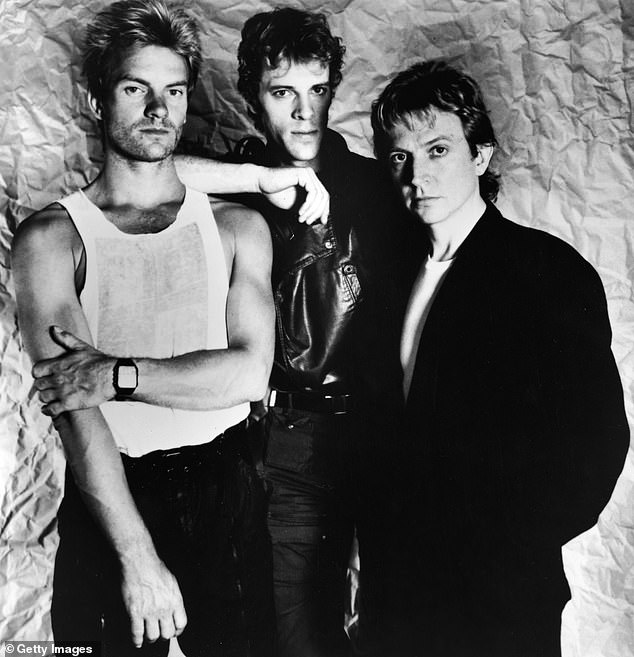
The singer, pictured left in 1983, was handed a High Court writ by the group’s guitarist Andy Summers, right, and drummer Stewart Copeland, centre
In 1986, The Police officially disbanded as the group exploded into resentment and anger, with Sting going on to launch a solo career.
Their personal gripes were by no means kept behind closed doors. The band members went public with their problems with back-handed jokes in the studio and even during interviews.
Copeland previously described Sting as an egotist, narcissist and misanthrope, who ‘not only hates humanity, but every human within the species apart from his own family and has an ego so large it is visible from the moon’.
The recording of Synchronicity – their fifth and final studio album – was fractious, with in-fighting leading to them recording parts in different rooms.
In his book, Police Diaries 1976-9, which recounts the band’s rise to stardom, the American drummer admits: ‘We love each other but we’re not birds of a feather. If he’s having a serene moment, I’m going to walk in and spill some beer on it.
‘If I’m hanging out with my friends enjoying some simple-minded entertainment and he comes in, suddenly I’m not funny any more and the whole situation is trivial.’
The pair met in 1976 when Copeland, then a member of the British prog-rock band Curved Air, had a tour break in Newcastle and went to watch Sting’s band Last Exit.
They achieved greatness alongside Summers, propelled to fame by hits including Every Breath You Take (1983) and Message in a Bottle (1979). But they only released five albums during their time together.
Marking their 30th anniversary in 2007-08, The Police did put their feud on ice for a hugely lucrative reunion tour with 152 shows over the world from Europe to South America.
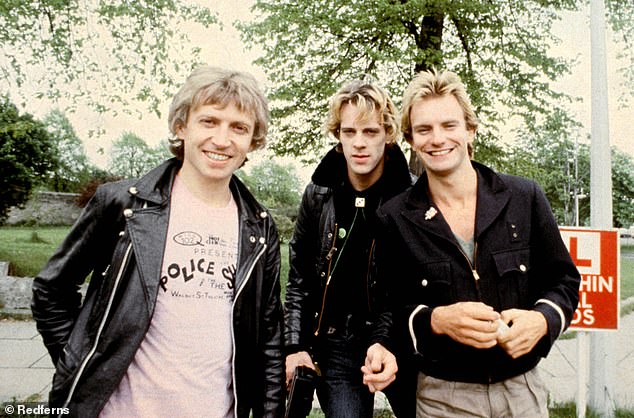
(L-R) Andy Summers, Stewart Copeland and Sting pictured together in 1979
The Reunion Tour saw the band earn a reported £292million, with guitarist Summers telling The Telegraph in 2022 he earned $1million a night.
‘The 2007 Reunion Tour was a giant pay-off for all of us and quite incredible: the most money I’ve ever made,’ he said. ‘We sold out every stadium in the world.
‘And I hate to say it – well no, I don’t hate to say it – I think I was the highest-paid guitarist in the world during that Reunion Tour. I got about $1m a night, and we did [about] 150 nights. Someone’s got to do the job.’
At the height of their fame, there were constant rumours of recording studio rows between Sting and Copeland. And when the reunion tour came around, wounds had not healed and the pair agreed to have joint therapy.
Speaking about what the sessions helped them conclude, Copeland said in his book: ‘Sting and I make music for different reasons. For him, it’s a place of beauty he goes to for the purity of creative thought, a sanctuary from the evil of the world, from the tensions of life, which he feels more strongly than I do. I’m a happy-go-lucky guy. And for me, it’s about torching the building.
‘You know, “Let’s burn this f***ing place down.” It’s not a serene place to escape to, it’s a bonfire I want to light! When we were young and co-dependent, those factors worked together. Old and grumpy was another matter. But we came to understand that better.’
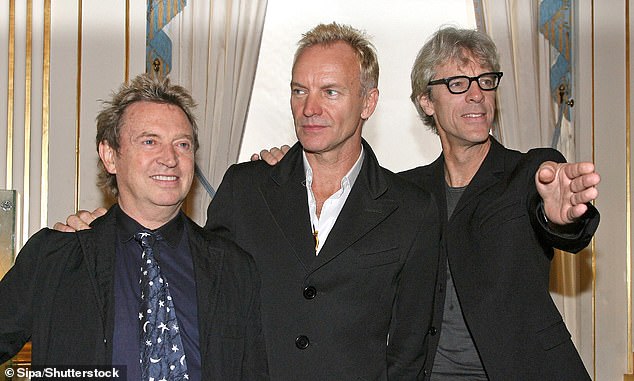
Andy Summers, Sting and Stewart Copeland pictured in October 2007
Copeland has gone onto compose for film, TV, opera, ballet and gaming – but he will forever be most famous for his time with The Police.
Despite adding endless strings to his bow, Copeland’s estimated net worth is a modest $80million compared to the $550million Sting has achieved through his songwriting royalties.
That is perhaps why Sting is now at the centre of an explosive legal battle, launched by his own bandmates.
The 73-year-old was handed a High Court writ by Summers and Copeland. The ‘substantial’ damages claim comes after many years of bitter legal disputes.
A source told The Sun: ‘This has been coming for quite some time. Lawyers tried repeatedly to reach an out-of-court settlement but hit a stalemate.
‘Andy and Stewart decided there was no alternative than court so pressed the button. They say they are owed millions in lost royalties.’
London‘s High Court lists the legal case under ‘general commercial contracts and arrangements’.
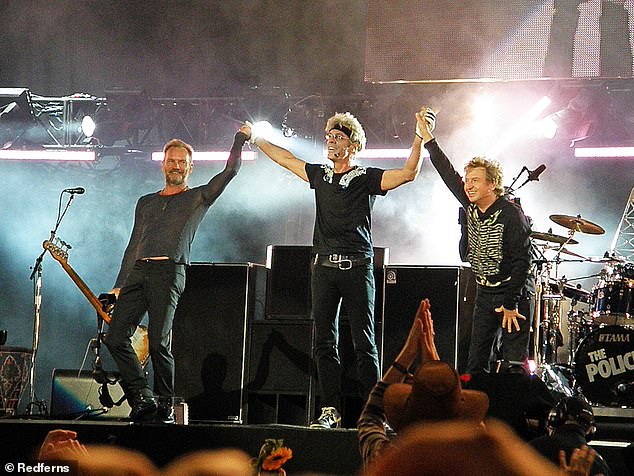
Sting, Stewart Copeland and Andy Summers of The Police take a final bow and wave the crowd farewell after performing on stage on Day 2 of ‘Hard Rock Calling’ on June 29, 2008, in Hyde Park, London
Sting is down as a defendant under his real name, Gordon Matthew Sumner, while his company Magnetic Publishing Limited is also listed as a defendant.
In 2015, The Police’s hit Every Breath You Take was listed by The Richest as the eighth most profitable song of all time, and reportedly earned Sting millions on its own.
Bandmates Summers and Copeland, however, were not handed songwriting credits on the single.
Sting has raked in more than $20.5million in royalties since its release in 1983, with the singer reportedly pocketing a cool $730,000 a year.
Alongside Sting’s battles with the group, he has also faced personal scandals.
His marriage to Frances Tomelty came to a disastrous end when Sting began having an affair with his wife’s friend and neighbour, Trudie Styler. In 1983, she became pregnant and stopped acting, going on the road with the band while Sting was still married.
Styler previously told The Guardian: ‘Neither of us are proud of a situation that happened – it just happened. We loved each other and we lived together and then we got married and we had more kids.’
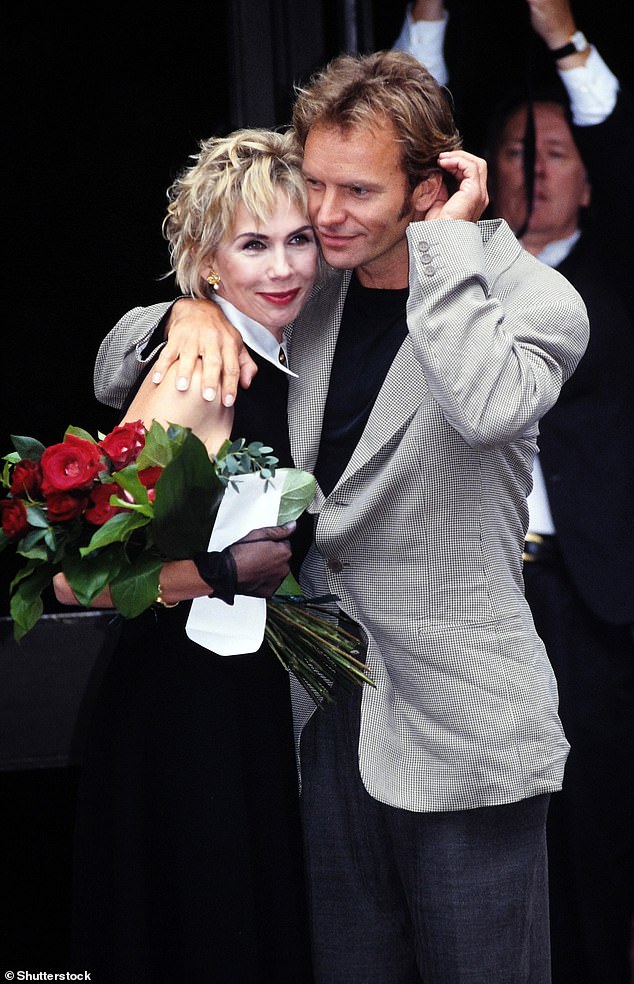
Sting and wife Trudie Styler on their wedding day in 1992. Their relationship started as an affair
She had been working regularly until work dried up when Sting described her as his mistress.
Sting has two children with his first wife, Joseph Sumner and Fuschia Sumner, and four others, Mickey Sumner, Jake Sumner, Eliot Sumner and Giacomo Sumner, with Styler.
In a 2020 interview with People, Sting said he ‘never intended to be a dad’, explaining: ‘I became a dad by accident six times — that’s how smart I am. Yet they were the happiest accidents of my life because they’re remarkable human beings.’
‘I can’t really take much credit for that, but they are, and they, too, have produced seven grandchildren at this point, who are also wonderful,’ he continued. ‘So all of this has happened by accident. I didn’t intend to be the patriarch of a tribe, but I am.’
Sting is also remembered for allowing the world to believe he was the master of ‘tantric sex’, which allowed him to make love to Styler for up to seven hours at a time.
He once explained: ‘The idea of tantric sex is a spiritual act. I don’t know any purer and better way of expressing a love for another individual than sharing that wonderful, I call it, “sacrament”. I would stand by it. Not seven hours, but the idea.’
He later admitted he didn’t have ‘a clue’ what Tantric sex was, adding that it came from a drunken boast to Bob Geldof at a dinner party.
The Police shot to stardom with their second album Reggatta De Blanc, the first of four albums on the spin to reach the top of the charts.
They bagged five UK number one singles and achieved a number one in the US with Every Breath You Take.
Their last tour ended in 1984, but there was no farewell to each other or to their fans.
Copeland founded the band in 1977, joining up with Sting and original guitarist Henry Padovani. Summers would go on to replace Padovani after the band wanted a trio with a more experienced guitarist.
But immediately there was understood to be a three-way power struggle. Sting said previously: ‘We didn’t go to school together or grow up in the same neighbourhood. We were never a tribe.
‘We care passionately about the music and we’re all strong characters and nobody would be pushed around. We fought over everything.’
The Daily Mail has approached Sting, Summers and Copeland for comment.












